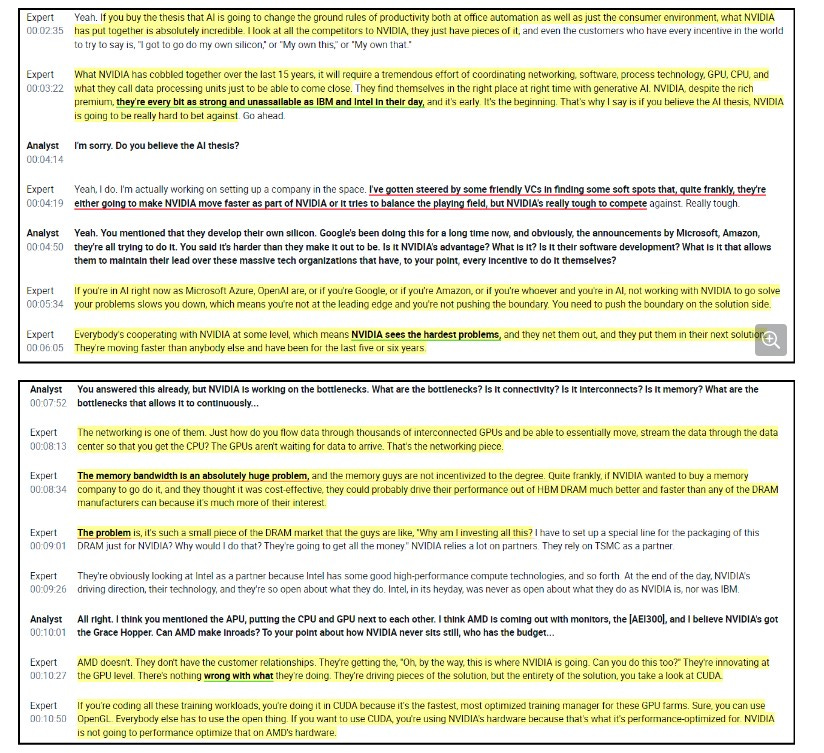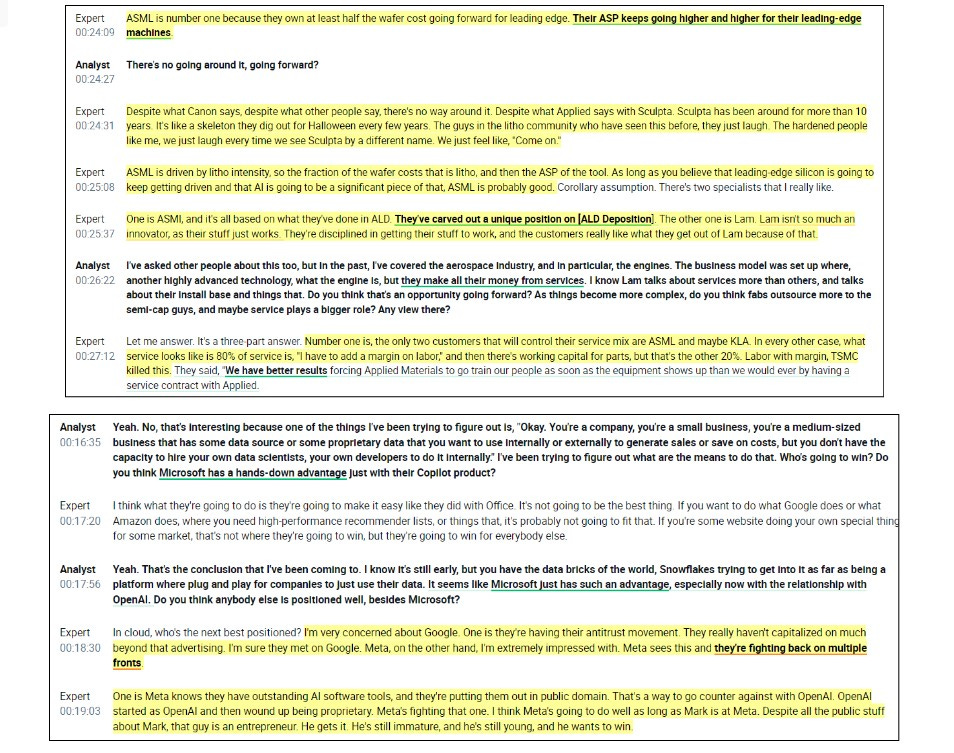Uncover Tech Insights - December 11-15
Weekly market stock moves
Expert interviews
Former Regional Unit Head at Google and Former AWS employee shares his view on the cloud industry:
In the past, Google was known as an innovative leader in the AI/ML space but not as an enterprise cloud platform, especially with Diane Greene at GCP. Thomas Kurian then changed that and shifted the strategy to more of a true enterprise platform.
GCP also shifted focus a lot, whereas Amazon’s AWS stuck longer to a strategy even if they didn’t see short-term results.
According to the expert, the real cloud differentiator is not price as they are very similar in offerings. It’s product offering (AWS has more products than GCP, for example), and it’s also, to some extent, the legacy of what developers are used to working with. One differentiator is also the ISV partner ecosystem, which AWS has a strong one. Google tried really hard to build a good partner ecosystem but hasn’t quite done it as successfully as AWS.
Regarding GenAI, the expert thinks that the big hypercloud providers will eventually own both the foundation and fine-tuned models. He believes that many smaller companies building these products based on fine-tuning these LLMs is short-term thinking.



Former VP at Intel Corporation and semiconductor industry expert shares his view on the industry, the AI cycle, and who might be the winning companies
In the expert’s opinion, Nvidia has a significant advantage over competitors and has put all the pieces together over the last 15 years to be in the right time and place for generative AI.
In his view, AMD doesn’t have the budget, customer relationship, or solution pieces as Nvidia does. He mentions the CUDA library as one of the key assets of Nvidia.
He is concerned about Google's position but is impressed by Meta with its positioning in AI as well as with the leadership of Mark Zuckerberg.
He also thinks ASML, with its EUV tech, is well positioned. He believes Applied Materials Sculpta is old technology and doesn’t make a real difference.


Most impactful news of the week
Amazon courts sellers at China summit as Temu and Shein gain momentum
Amazon is seeking to strengthen its ties with China-based sellers by announcing plans to open an "innovation center" near Shenzhen, a prominent hub for technology companies and cross-border e-commerce. The center aims to support sellers in the Asia-Pacific region in product launches, brand building, and digitization. Additionally, Amazon is providing Chinese sellers with access to its end-to-end supply chain service, which facilitates the movement of goods from overseas factories to Amazon and other channels in a streamlined process. This move comes as Amazon faces increased competition from discount online retailers like Temu and Shein, both rooted in China.
Intel unveils new AI chip to compete with Nvidia and AMD
Intel has introduced new computer chips, including Gaudi3, an artificial intelligence (AI) chip designed for generative AI software. Gaudi3 is set to launch next year and aims to compete with chips from Nvidia and AMD that power large AI models. Nvidia currently dominates the market for AI chips, with its GPUs being widely used for running prominent models like OpenAI's ChatGPT. Intel's move reflects the competition among chipmakers to challenge Nvidia's position in the growing AI market.
How the Maker of ‘Fortnite’ Beat Google and Got Its Mojo Back
Google faced a setback in an antitrust case related to its app store's market power. The lawsuit, brought by Epic Games in 2020, claimed that Google exploited its dominant position to extract excessive profits from app developers. The San Francisco jury delivered a unanimous verdict in favor of Epic Games after deliberating for less than four hours. This legal defeat adds to Google's challenges in dealing with various antitrust issues, including a major trial focused on its dominant search engine. Epic's lawsuit was part of a broader initiative against fees imposed by Google and Apple on mobile app developers.
Temu sues Shein, alleging ‘Mafia-style’ intimidation of manufacturers
Online shopping platform Temu has filed a lawsuit against fast fashion giant Shein, accusing it of using "Mafia-style" intimidation tactics on merchants. Temu alleges that Shein has engaged in aggressive strategies to "illegally interfere" with Temu's business, including intimidating merchants listing products on both platforms and issuing illegitimate copyright takedowns. The suit claims that Shein has gone so far as to falsely imprison merchants doing business with Temu. Shein has not yet responded to the allegations.
Alphabet Needs to Show Path to AI Sales in Race With Microsoft
Alphabet Inc. experienced an $87 billion increase in market value in a single day after showcasing the capabilities of its Gemini large language model, which is positioned as a competitor to OpenAI's ChatGPT. While this highlighted Alphabet's prowess in AI, the company now needs to demonstrate how this technology will contribute to increased sales and overall business growth. Investors are keen to see how Alphabet can leverage its AI advancements to drive user engagement and, subsequently, enhance its core businesses like search.
China’s iPhone Ban Accelerates Across Government and State Firms
Multiple Chinese state firms and government departments in at least eight provinces have reportedly instructed employees to stop bringing iPhones and other foreign devices to work. This move represents an escalation of a trend that began around September when a few agencies in Beijing and Tianjin initiated similar directives. The broader prohibition is likely to impact Apple and Samsung's access to significant portions of the Chinese mobile market, posing challenges for these companies in the world's largest mobile market.
The EU AI Act passed — now comes the waiting
The European Union has reached a provisional agreement on its landmark AI regulation, known as the AI Act. The agreement paves the way for the EU to prohibit certain uses of AI technology and demand transparency from providers. However, the details of the changes required from AI companies are still unclear, and enforcement is not expected to start for several years. The compromise reached on the AI Act is not expected to have an immediate direct impact on major AI designers based in the US, as it is likely to take effect around 2025. Companies like OpenAI, Microsoft, Google, and Meta are expected to continue competing for dominance while navigating regulatory uncertainty in the US.
OpenAI, Meta, Microsoft Chase Wearable AI
In the coming year, the artificial intelligence battle is expected to revolve around smart glasses and wearable devices with forward-facing cameras. Companies like Meta Platforms, Google, Microsoft, and OpenAI are racing to apply powerful AI capabilities that understand images, language, and multimodal inputs to enhance the functionality of smart glasses. For example, OpenAI is reportedly considering embedding its object recognition software, GPT-4 with Vision, into products from Snapchat's parent company, potentially introducing new features to Snap's Spectacles smart glasses. The focus on wearable devices signifies the growing importance of integrating AI into hardware for enhanced user experiences.
Amazon’s Internet Satellites Will Use Space Lasers to Transmit Data
Amazon is planning to use space lasers, officially known as optical inter-satellite links, to ensure reliable broadband coverage, even in remote areas like the middle of the ocean. This technology allows a satellite to transmit data to a destination, such as a cruise ship, by utilizing lasers to communicate with another satellite that has a clear line of sight to a ground station connected to the internet. The use of space lasers enhances connectivity and ensures continuous coverage even in challenging and remote environments. Amazon successfully tested this technology with two prototype satellites.
TikTok’s Unanswered European Question
TikTok's e-commerce feature, TikTok Shop, has not been launched in the European Union (EU), including the UK, and there is no clear indication of when or if it will be introduced. The delay may be influenced by the Digital Markets Act, a forthcoming EU law that imposes restrictions on how major tech platforms, including TikTok, can use user data for targeted advertising and product sales. This legislation has already prompted Meta Platforms to announce ad-free versions of Instagram and Facebook, and Amazon is negotiating changes to its European business in response to the law.
Snowflake Is on an R&D Spending Tear to Nab Generative AI Clients
Snowflake, a cloud data company, is increasing spending on research and development (R&D) as it focuses on building tools that allow companies to experiment with generative artificial intelligence (AI) in their operations. Snowflake's platform facilitates the storage, organization, and analysis of data across various cloud providers. The company aims to enable its customers to leverage the data on its platform for testing and refining AI models, leading to significant investments in R&D. This move comes as Snowflake looks to capitalize on the growing interest and adoption of AI technologies by businesses.
Hidden gems
Adam Mosseri spells out Threads’ plans for the fediverse
Adam Mosseri, the head of Instagram, shared plans for the integration of Threads with the fediverse, providing a glimpse into Meta's intentions for interoperability. The outlined plans include allowing all public Threads accounts to be followed from other platforms, requiring explicit opt-in for showing posts on federated servers (with consideration for making this the default), enabling replies from other platforms within Threads, supporting the ability to follow non-Threads fediverse accounts, and working towards follower portability to allow creators to move to another app/server while retaining their audience. The goal is to achieve these enhancements over the course of approximately a year.
TikTok to Invest More Than $1.5 Billion in GoTo to Restart Indonesia E-Commerce Business
TikTok, owned by Bytedance, is set to invest over $1.5 billion in a deal with Indonesia's GoTo Group. The agreement will allow TikTok to resume retail operations in Indonesia, a key e-commerce market. As part of the deal, TikTok Shop Indonesia will be combined with GoTo's Tokopedia platform, with TikTok holding a 75% controlling stake. The transaction involves Tokopedia buying assets and rights of TikTok's Indonesian shopping business for $340 million, while TikTok will invest $840 million in Tokopedia through new shares. The deal is expected to close in Q1 2024.
Meta’s AI for Ray-Ban smart glasses can identify objects and translate languages
Meta has announced the rollout of its multimodal AI features for the Meta Ray-Ban smart glasses, allowing users to try out its advanced capabilities. The features utilize the glasses' camera and microphones to enable the AI assistant to see and hear, providing information based on the user's surroundings. The early access test will allow users to experience the enhanced functionality of the smart glasses.
Thanks for reading Uncover Tech Insights! Subscribe for free to receive new posts and support my work.
We would really appreciate it if you could share it with someone you know who would be interested in tech investing news. Organic, and especially word of mouth, is the main way our newsletter will grow. We will always put quality before quantity. Thank you.
Source: the expert interviews are found on Alphasense, a platform specialized for expert interviews and other investment data.
Disclaimer:
Nothing contained in this website and newsletter should be understood as investment or financial advice. All investment strategies and investments involve the risk of loss. Past performance does not guarantee future results. Everything written and expressed in this newsletter is only the writer's opinion and should not be considered investment advice. Before investing in anything, know your risk profile and if needed, consult a professional. Nothing on this site should ever be considered advice, research, or an invitation to buy or sell any securities.




